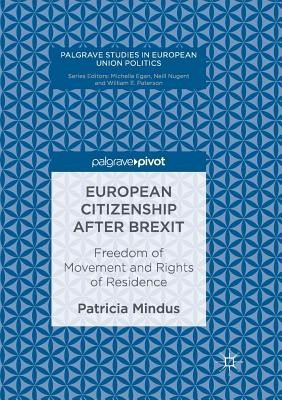
- We will send in 10–14 business days.
- Author: Patricia Mindus
- Publisher: Palgrave Macmillan
- ISBN-10: 3319847376
- ISBN-13: 9783319847375
- Format: 14.8 x 21 x 0.7 cm, minkšti viršeliai
- Language: English
- SAVE -10% with code: EXTRA
Reviews
Description
This book is open access under a CC BY 4.0 license.
This Open Access book investigates European citizenship after Brexit, in light of the functionalist theory of citizenship. No matter its shape, Brexit will impact significantly on what has been labelled as one of the major achievements of EU integration: Citizenship of the Union. For the first time an automatic and collective lapse of status is observed. It is a form of involuntary loss of citizenship en masse, imposed by the automatic workings of the law on EU citizens of exclusively British nationality. It does not however create statelessness and it is likely to be tolerated under international law. This loss of citizenship is connected to a reduction of rights, affecting not solely the former Union citizens but also second country nationals in the United Kingdom and their family members.
The status of European citizenship and connected rights are first presented. Chapter Two focuses on the legal uncertainty that afflicts second country nationals in the United Kingdom as well as British citizens, turning from expats to post-European third country nationals. Chapter Three describes the functionalist theory and delineates three ways in which it applies to Brexit. These three directions of inquiry are developed in the following chapters. Chapter Four focuses on the intension of Union citizenship: Which rights can be frozen? Chapter Five determines the extension of Union citizenship: Who gets to withdraw the status? The key finding is that while Member states are in principle free to revoke the status of Union citizen, former Member states are not unbounded in stripping Union citizens of their acquired territorial rights. Conclusions are drawn and policy-suggestions summed up in the final chapter.
EXTRA 10 % discount with code: EXTRA
The promotion ends in 23d.19:22:26
The discount code is valid when purchasing from 10 €. Discounts do not stack.
- Author: Patricia Mindus
- Publisher: Palgrave Macmillan
- ISBN-10: 3319847376
- ISBN-13: 9783319847375
- Format: 14.8 x 21 x 0.7 cm, minkšti viršeliai
- Language: English English
This book is open access under a CC BY 4.0 license.
This Open Access book investigates European citizenship after Brexit, in light of the functionalist theory of citizenship. No matter its shape, Brexit will impact significantly on what has been labelled as one of the major achievements of EU integration: Citizenship of the Union. For the first time an automatic and collective lapse of status is observed. It is a form of involuntary loss of citizenship en masse, imposed by the automatic workings of the law on EU citizens of exclusively British nationality. It does not however create statelessness and it is likely to be tolerated under international law. This loss of citizenship is connected to a reduction of rights, affecting not solely the former Union citizens but also second country nationals in the United Kingdom and their family members.
The status of European citizenship and connected rights are first presented. Chapter Two focuses on the legal uncertainty that afflicts second country nationals in the United Kingdom as well as British citizens, turning from expats to post-European third country nationals. Chapter Three describes the functionalist theory and delineates three ways in which it applies to Brexit. These three directions of inquiry are developed in the following chapters. Chapter Four focuses on the intension of Union citizenship: Which rights can be frozen? Chapter Five determines the extension of Union citizenship: Who gets to withdraw the status? The key finding is that while Member states are in principle free to revoke the status of Union citizen, former Member states are not unbounded in stripping Union citizens of their acquired territorial rights. Conclusions are drawn and policy-suggestions summed up in the final chapter.


Reviews